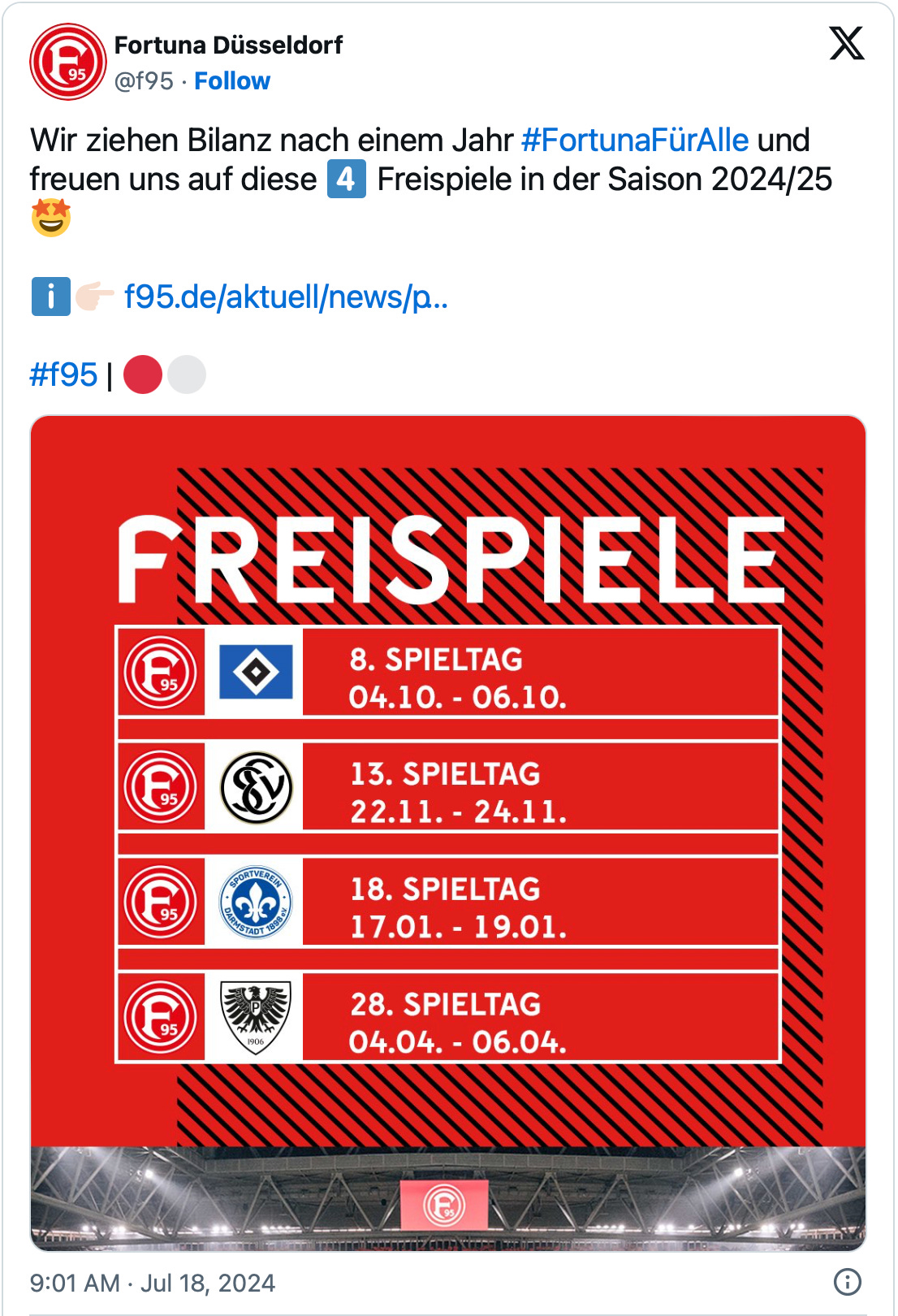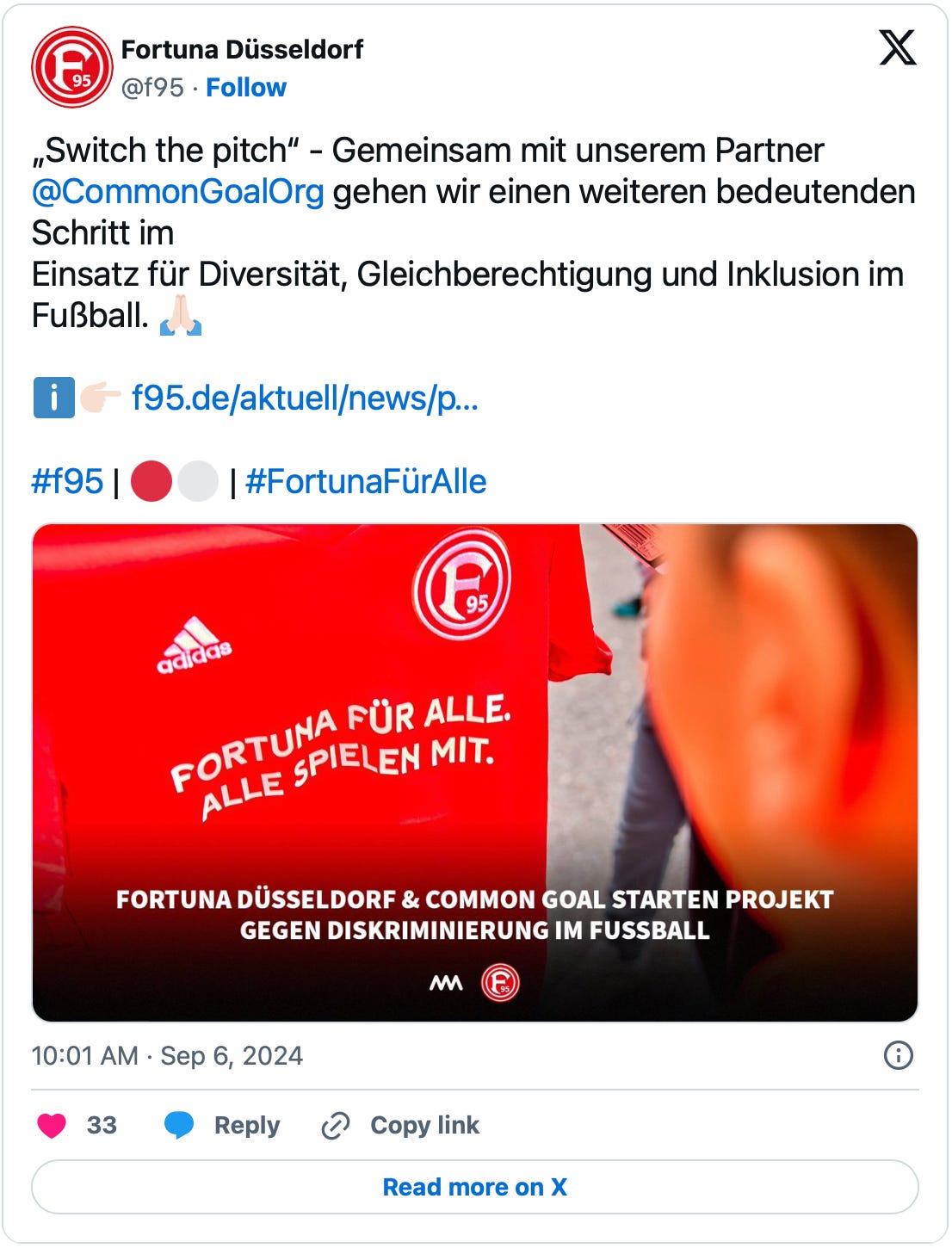Dusseldorf's Dilemma: Why Fortuna Give Away Tickets for Free 🎟️
The gradual loss of matchday revenue is intended to be compensated by sponsors, who have also pledged to develop the club’s youth academy, women’s football team, and digital infrastructure
Not yet a subscriber? Join over 2,500 sports business leaders, from Formula 1 to the Premier League, that read Sports Pundit every week to get impactful industry insights.
BIG IDEA
When becoming CEO of Fortuna Düsseldorf, Alexander Jobst was presented with a unique problem.
The club’s impressive Merkur Spielarena, which was home to matches during this summer’s European Championships, boasted a capacity of 54,600. Yet, as a club in the second division of German football, Bundesliga 2, Fortuna’s average attendance hovered just under 30,000—a respectable figure, but one that left room for improvement. Literally.
Faced with this challenge, Fortuna Düsseldorf and Jobst ideated and then unveiled ‘Fortuna For All’ at the end of the 2022/23 season - a plan which would upend one of the most sacrosanct pillars of football revenue: ticketing.
This ambitious project, which offers free admission to all spectators, isn’t a one-off gesture of goodwill but a calculated tactic designed to make the club more competitive and to boost its overall revenue streams, as Jobst explained recently on the Sports Pundit Podcast.
"We are a member-driven football club. We are in a highly competitive market with investor-driven football clubs... We had to think about how can we still be competitive for the future, maintaining the chance and even heightening our chance to be a first-division football club... That's the reason behind Fortuna for All," Jobst explained.
The campaign kicked off in 2023/24, and its impact was almost immediate.
On the first match of the project, Fortuna pulled off a stunning 4-3 comeback against rivals Kaiserslautern in front of a packed stadium—a game for which there were over 120,000 ticket requests.
Across the three free matches offered last season, the club received a staggering 350,000 ticket requests, far exceeding expectations and proving both the demand and interest in the initiative.
But the benefits of ‘Fortuna For All’ went far beyond just filling seats. The initiative also played a crucial role in the club’s digitalisation strategy.
“Before that, we did not have any registered members in our fan database as a second division football club. Now we are a huge step forward and we want to enlarge this also for the future, which brings us more community, more engagement, and more connection with our fans.”
This digital platform, as Jobst explained, is “the heart and the brain of the business model behind it.”
By lowering the barrier to entry, Fortuna not only filled their stadium but created a vast new pool of engaged fans, many of whom became season ticket holders, club members, returned for other paid matches, or bought club merchandise.
The results so far are impressive: a 28% increase in ticket income despite hosting three games for free, a 19% increase in season ticket sales, a 20% rise in membership to 33,000, and significant boosts in other revenue streams.
"To give you a few figures, we increased the sponsorship revenue by more than 50% in comparison to the season before. We increased our merchandise sales above 50% because people come to the stadium, some of them for the first time in their life, they get emotionalised [and so] they have a lower barrier to buy their shirt or their scarf," Jobst noted.
Encouraged by these early successes, Fortuna Düsseldorf is expanding the scheme this season to include four matches against Hamburg, Elversberg, Darmstadt, and Preußen Münster.
The only requirement to apply is to have an account with the Fortuna online ticket shop—a move that further integrates fans into the digital ecosystem the club is building.
The gradual loss of matchday revenue is intended to be compensated by greater investment from sponsors, who have also pledged funds to develop the club’s youth academy, women’s football team, and digital infrastructure.
Fortuna already has deals in place with the likes of Hewlett Packard Enterprise (HPE), Targobank, Yayla, 11Teamsports, and Common Goal, but the club acknowledges that more commercial partners will be needed to continue expanding the number of free matches each season.
“We just started. We are very happy with the results of the first season, which proved us [right] in the figures, in the results, but we have to go further,” said Jobst.
“To drive it to the next level, we need more partners. We need more partners who are convinced about this concept. The criticism is getting lower. Current partners are very happy, and we have to communicate, and we have to tell the story also for the future long-term perspective for other commercial partners who are joining us.”
Fortuna Düsseldorf's experiment raises an intriguing question: Can other clubs replicate this model? The answer is both yes and no.
On the one hand, Fortuna’s approach makes a compelling case for rethinking traditional revenue models in football. By focusing on building a broader, more engaged fan base, Fortuna has managed to tap into new revenue streams and secure long-term sponsorships. The club has shown that it's possible to sacrifice immediate revenue in one area to grow others, ultimately creating a more sustainable and resilient business model. For clubs with a strong community focus and a commitment to long-term growth, this model could be revolutionary.
However, not every club is able to make such a sacrifice. The success of ‘Fortuna For All’ also hinges on its ability to secure long-term sponsorships, a feat that may not be as easily achieved elsewhere. Fortuna Düsseldorf benefits from being based in a prosperous city with a large potential fan base. Having a modern stadium with a high capacity also means there was already a significant opportunity to increase attendance, too.
For clubs in smaller cities, with older stadiums or less affluent populations, the risks might outweigh the potential rewards. As Jobst himself pointed out, "It's not a copy-paste situation for any other club." Each club must consider its unique circumstances before attempting such a radical transformation.
In the end, ‘Fortuna For All’ is more than just a business model; it’s a statement about the kind of club Fortuna Düsseldorf aspires to be.
It’s a club that values its community, that sees football as more than just a business, and that believes in the power of inclusivity to drive long-term success. As other clubs watch this experiment unfold, they may find inspiration to rethink their own approaches, even if they don't follow Fortuna's path exactly.
THE PODCAST
Want to hear more from my conversation with Alexander?
We discuss his journey to becoming CEO, his long-term vision for Fortuna Düsseldorf, his approach digital transformation, the business model and revenue impact of ‘Fortuna for All’, applying the model elsewhere, and much, much more.
Listen to the full podcast via the link below - and I’d love to hear what you think! 👇
Not yet a subscriber? Join over 2,500 sports business leaders, from Formula 1 to the Premier League, that read Sports Pundit every week to get impactful industry insights.










